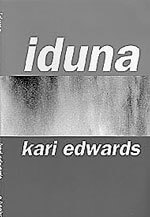kari edwards’ latest cri de coeur sets sexist grammarians’ teeth on edge
Detective Steven Elter was quoted in the Daily News as saying, “I think they were just mentally distraught, fed up with how people were treating them.”
Perhaps that was the case, but theirs wasn’t simply an act of desperation. The tree escapade was, in its way, a wild performance piece by people at the cultural margins shrieking at the mainstream. Were Rund a revolutionary poet like kari edwards, she might have written a book like “iduna.”
Flipping through “iduna,” you know you’re far from gay literature’s typical ground. Though edwards told me the title comes from the 18th century German poet, Johann Christian Friedrich Holderlin, it is also the name of the Norse goddess of runes. Teeming with language and symbols, “iduna” looks like the birth, and the ruins, of runes. It is a collection of poems, but it is also a pastiche. Typefaces and symbols accrete in layers, upside-down, inside out, sideways, slant-ways, and backwards. They fill up and spill from the margins. It is not only a literary, but also a visual feast.
Behind the organized chaos of “iduna” are not only edwards’ artistic interest in assemblage, but also political and environmental concerns. There is “a precious commodity”—trees.
“To leave a space in this natural resource is to misuse this resource,” edwards told me, so the page is packed with graphics and text. “iduna,” edwards says, “is not just a book, but an offering made as a book from a tree.”
In “iduna,” edwards’ gender identity is both naturalized and radicalized in a kinship with trees. In “november 28th’s carrier pigeon,” edwards writes, “I am a man being a woman/I am a woman being a man/I am a homosexual man being a straight woman being a homosexual man—/I am a homosexual woman being a straight man being a homosexual woman—//I am a tree in disguise/with an edge predicament.”
If trees represent nature, and in a sense, reality, then edwards is claiming personal space, as well as space for transgender identities, in the natural order, or disorder.
But edwards’ identity is far from rote identity politics. edwards’ identity remains on edge, a predicament. Later in the book, edwards complicates the arboreal analogy with the poem titled “maybe a tree is too perfect.”
And a few pages later, the poem “I could be a fire place” is burning up the tree’s offering, the page.
Internal contradictions and complications course through “iduna”: “I am working on a concept of where I am so I can destroy it along with those objects I bought yesterday//… drench me in language that is a concept of ashes so I can dream it.//it is an equation—a simple one at first—then as if in paradox—others enter—it becomes something else.”
What we think we know of identity, thought, language, reality, edwards calls into question. There are no simple truths. But that does not mean there is no truth at all.
Instead, truth “becomes something more than when first discovered—like the one who found a statue of someone who never existed—in a field that was a myth—that was carried from one generation to the next—on the backs of butterflies and wings of wing-tip shoes” (“How to explain a picture to a dead hare”).
Nature and culture collude to create what we call “reality,” which is grounded in the material, including the body, but is up for grabs on all levels—materially, politically, mystically, and linguistically. “this is an open letter. this is not a letter. this is the letter “e.” there are no letters, in this alphabet, that walks down the street. there are no words that adequately describe anything; they signify the already multiple layered stains of history’s concrete (cement)/stone{steel}—speeding bullets, guillotine Sundays and/or electric shock holidays”…“even verbs carry certain chain gang evening wear: schmooze, rubberneck, master” (“dear to those not driving the car,”).
Language is the master’s tool, and in “iduna,” that tool is twisted out of all proportion. Governmental policy, war propaganda, commercial advertising, “reason, science, law” (to borrow one of edwards’ titles) are challenged. edwards screws with narrative structure, grammar, syntax, punctuation— and spelling.
“Mistakes,” edwards told me, constitute “another level to take the revolution… another area that has become segmented into the proper and not proper… right and wrong… male and female.”
This subversion of binary thinking and forms of categorical language might appear intimidating to a reader used to cohesive sentences and narrative. But it would be a mistake to say this narrative style disempowers.
On the contrary, edwards’ subversion of “normal” language gives the reader more power. Reading “iduna” is an anarchic process of discovery and creation. As edwards told me, “I do not believe in the two-way street of being ‘read’ and ‘not’… it is about the confusion… the queerness of the book as text and texture.” Interpretations—and “reading” itself—are up for grabs.
Identity, it follows, is up for grabs too. The “I” is a construct, explains Edwards. Constructs can, and should, be deconstructed, because anything so rigid as the “Standing ‘I’” eventually becomes totalitarian. Non-problematic identity is “name and volume area name and address place of birth destination purpose did you ask a question name and address can you address your name will you be wearing a dress or dressed or the second step coming states debit card address and digital divide over the formally depressed futurely depressed presently crushed into a box” (“our return policy on suicidal fantasies”).
From the transgender perspective, “everything is a relative pronoun to be renegotiated,” and for a political radical like edwards, that renegotiation is ongoing.
“I rerevolutionize my remaining interior,” edwards writes.
This problematical, fluid notion of identity is the basis for her political resistance: “I rebel against retrograde regurgitation of reissued regimes reformation refraction held in high regard as a reminder of something I am repulsed by” (“what’s the word for that?”)
If everything is problematical and fluid, is anything essential? In the poem, “something at the primary condition counter,” there is perhaps an answer. If there is an essence in us, it is “the soul that is the radiance of because.” In the poem, because is followed by a comma. “Because,” is thus an open end, not the start of a conclusion. The “soul of because” is not the soul of organized religion. It is not “the ‘I’ of the soul that distorts the because held just above ourselves outside ourselves as if immortality could dim the windows of radiance.” It is the answer that is not an answer. It is Gertrude Stein’s deathbed proclamation who asked “What is the answer?” and when no one replied, exclaimed, “In that case, what is the question?”
“I sit and scream over everything,” edwards writes (“searching obstructionist’s enthusiasm”), like William Rund in the tree. But we’re fortunate enough that edwards is a poet, because that scream is something all of us can use. In a time of war and torture, in the face of political oppression and official lies, kari edwards’ “iduna” reminds us to question authority. And then to question our questions. And to question our questions about our questions. And so on.
We also publish:


































